WORTH SUPPORTING
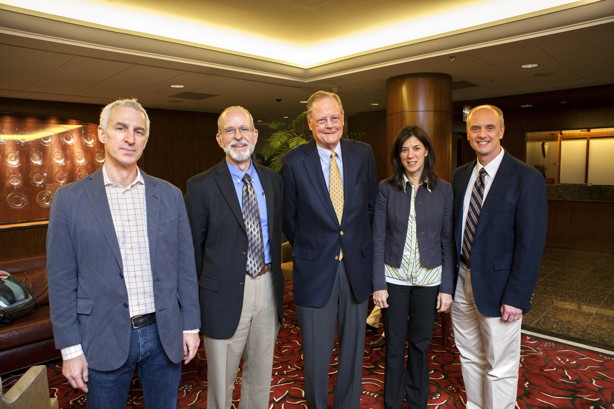
From left, Todd Cowen, faculty director for energy at the Atkinson Center for a Sustainable Future; Frank DiSalvo, ACSF director; David Atkinson '60; Wendy Wolford, faculty director for economic development; and Alex Travis, faculty director for the environment.
New Atkinson gift enhances sustainability leadership
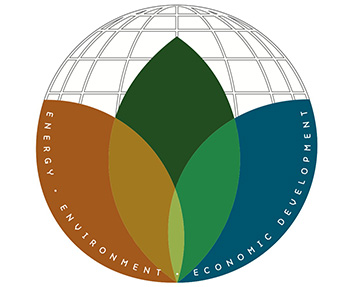
Atkinson Center logo. See larger image
It has always been true that today's decisions – and the research that informs them – will shape the world we live in tomorrow. But never before has there been more urgency to make the right decisions informed by the right research.
Consider: A quarter of the human race currently has no access to electricity. Half of the world lives on $2.50 a day or less, and one in nine people do not have clean water. Plant and animal species are becoming extinct at an astonishing rate, climates are changing, sea levels are rising, and extreme weather disasters are increasing.
The David R. Atkinson Center for a Sustainable Future (ACSF) was founded, with an $80 million gift from David '60 and Patricia Atkinson, on the belief that we can address these challenges by bringing together experts from all disciplines to deliver creative solutions.
"Cornell has this strength in a number of different areas that you don't get in all universities. The interaction and the connectivity between the diverse schools is what makes it incredibly effective," says Jefferson Tester, the Croll Professor of Sustainable Energy Systems and a former associate director at ACSF.
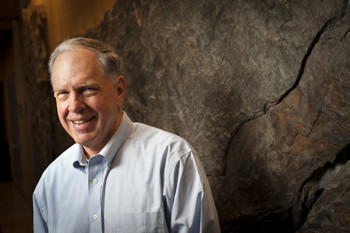
Jefferson Tester, former ACSF associate director. See larger image
Recognizing that effectiveness, the Atkinsons recently made a gift to fully endow the center's directorship and to establish a challenge campaign to endow the three ACSF faculty director positions. For every $2 million a donor gives for a faculty director chair, the Atkinsons will contribute another $1 million to endow each of the three faculty leadership positions that oversee the center's three main research areas: energy, the environment and economic development.
"I have been a professor for 12 years, and it is pretty rare that you get to spend a lot of time engaging with the bigger questions that we are facing in the world today," says Wendy Wolford, the Polson Professor of Development Sociology and ACSF faculty director for economic development. "You often get caught up with your own research, with publications and with teaching. As a faculty director, it has been a real privilege to move out of that and work with a group of people who care about making a difference and making an impact."
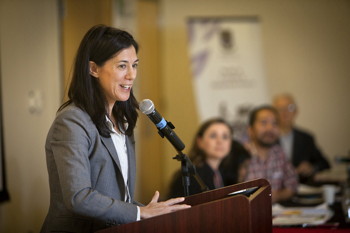
Wendy Wolford. See larger image
When the positions are endowed, faculty directors will have more than double the time to engage the big questions. Under the current system, the faculty directors maintain their regular jobs as professors with teaching, research and service obligations. The endowments will allow them to devote half their time and energy to ACSF – fostering interdisciplinary collaborations by connecting faculty from different departments to each other and connecting internal faculty teams with external partners, a key focus of the new strategic plan.
ACSF's most recent strategic plan is focused on leveraging Cornell's sustainability research to form partnerships with outside companies, people, foundations and organizations to quickly press research into action. The faculty directors will connect faculty with external partners to speed the delivery of research-based approaches to communities in need.
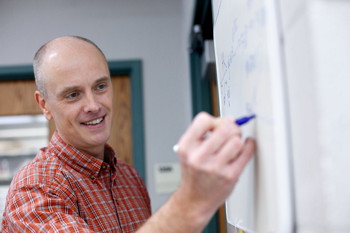
Alex Travis. See larger image
"An important role is to develop partnerships with the outside world – both private sector and [nongovernmental organizations]," says Alex Travis, ACSF's faculty director for the environment and an associate professor of reproductive biology in the College of Veterinary Medicine. "We could come up with the best technology in the world to solve a problem in sustainability, but if there isn't a business that can get that technology to be used widely, or a partner to disseminate that knowledge, we won't be able to have impact at the scale needed to really make a difference."
Emilyn Teh '14 is an intern with the Atkinson Center for a Sustainable Future.